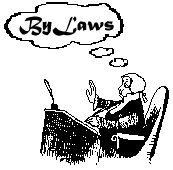TIPS
on Parliamentary
Procedure
According to
Robert's
RULES OF
ORDER

 Bylaws - The Best Advice
Bylaws - The Best Advice
Your Bylaws state which one Parliamentary Authority will rule your organization. I have seen many club officers blend several parliamentary rule books to rationalize their decisions. Later, the same club officers cite a different parliamentary source to justify other actions. The powerless membership allows itself to be manipulated and deprived.
If you become familiar with your Bylaws, you will win half of your battles merely because you will probably be the only person who has ever read the Bylaws in your organization. Knowing a little Parliamentary Procedure and the Bylaws will make you the most successful member of your organization!
- Typical Basic Bylaw Articles
- Name.
- Object and Reason for the group's existence.
- Members.
- Officers.
- Meetings.
- Executive Board or Board of Directors.
- Committees.
- Parliamentary Authority.
- Amendment of Bylaws.
There must be no ambiguity as to the identity of the group.
This alone will help you combat abuse of power, and will help you keep the organization focused.
This explains the members' rights, limitations, and qualifications. It clarifies issues such as fees, attendance, resignations, and honorary membership.
Explains methods for nominations, voting, elections, and filling vacancies, as well as term of office and duties.
Details quorum, regular meetings, special meetings, and conventions.
Often, the remaining Articles are referred to as the Constitution. In many cases, organizations refer to all the 9 Articles as the Constitution and the Bylaws as if they were one document.
The board's composition, power, and quorum are clearly stated in this article.
Standing committees must be described as to name, composition, manner of selection, attendance, and duties.
The rules of order must be clearly established. It could be Robert, Sturgis, Cannon, Demeter, Riddick, etc. The important thing is to have a document which assures order under fire. Regardless of the rule book, an organization is ruled first by local, state, and federal laws; and then by its parent organization; followed by any adopted special rules of order; and finally by its adopted parliamentary authority.
Typically, a Bylaw can be amended with 2/3 of the collected votes, if a prior notice has been given during the prior meeting. Otherwise, it takes a majority of the entire registered membership to amend any Bylaw.
Some organizations have additional Articles for matters of Finances, Policies, or Discipline. Nevertheless, once you read the Bylaws, you will be more powerful than any club officer. Try it. After all, you do know what is best for your organization. Right?
![]()
parliam@roberts-rules.com a member of
National Association of Parliamentarians and
American Institute of Parliamentarians Created by Cuesta Web Designs; Sacramento, California